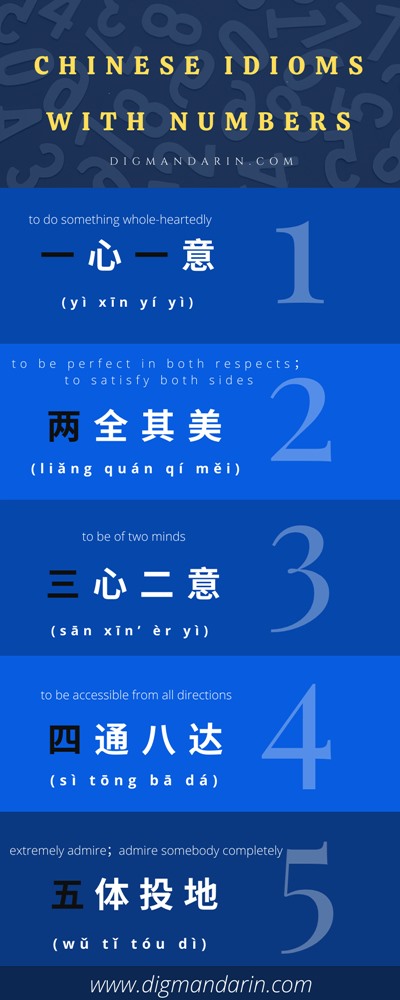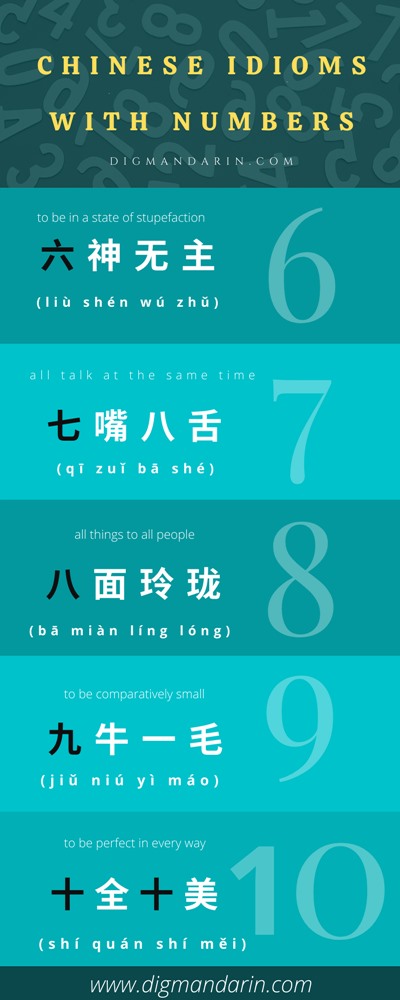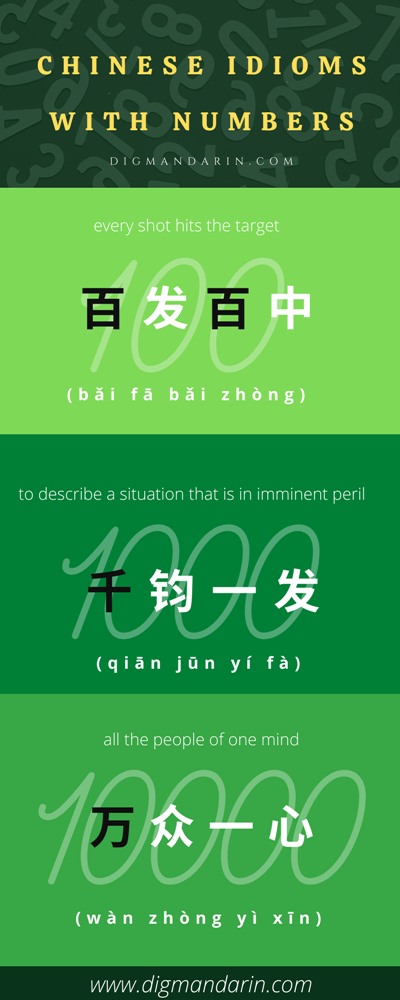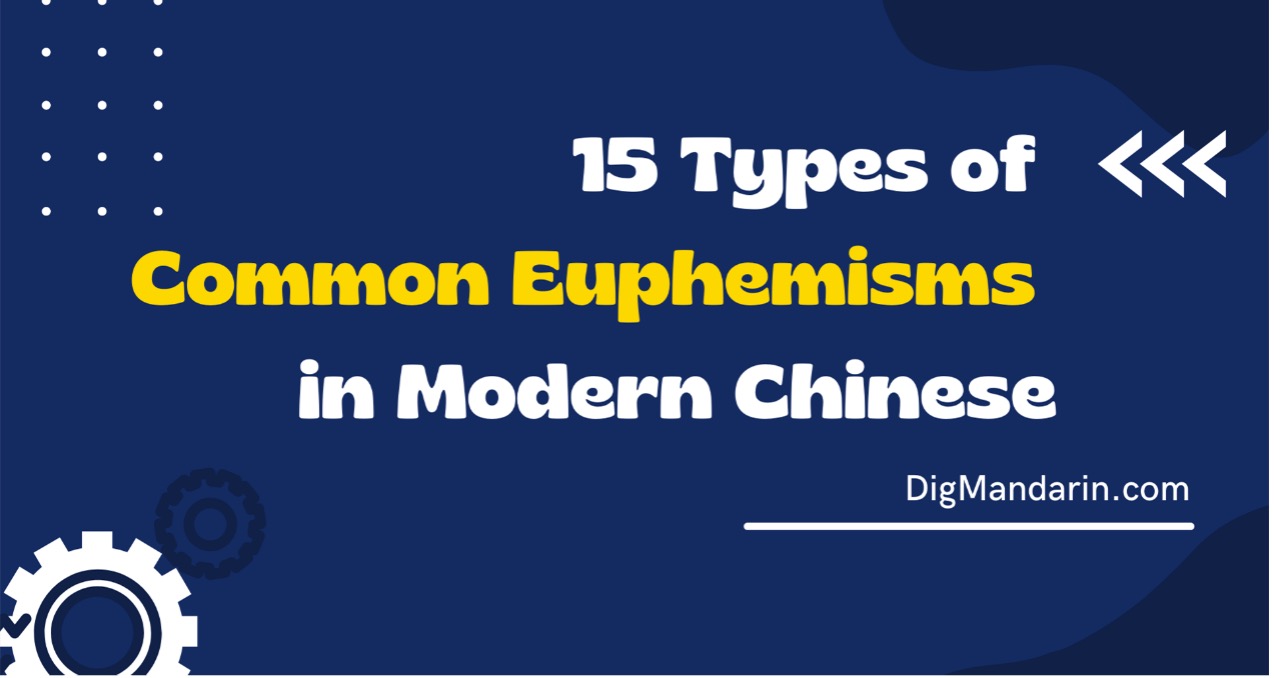13 Commonly Used Chinese Idioms With NUMBERS
In this article, we are going to explore some special Chinese idioms or figures of speech that involve numbers. Numbers can be used to express a lot of things, not just to count, and when they are used as idioms, they can mean something different. These figures of speech can express thoughts and ideas even more clearly than by just stating the meaning directly. Let’s take a look at thirteen of these idioms with numbers below:
1. 一心一意 (yì xīn yí yì)
to do something whole-heartedly
This literally means “one heart, one idea.” It is used to express a state of doing something intently,and can also be translated as “to do something whole-heartedly”.
For example:
做事情应该要一心一意。(Zuò shìqing yīnggāi yào yì xīn yí yì.)
We should do things whole-heartedly.
他一心一意想见你,你就见他一面吧。 (Tā yì xīn yí yì xiǎng jiàn nǐ, nǐ jiù jiàn tā yí miàn ba.)
He wants to see you intently, just give him a few minutes.
Since “一心一意” expresses doing something whole-heartedly, what about the opposite? HOW TO EXPRESS DOING SOMETHING “UN WHOLE-HEARTEDLY?” Here we point to the second idiom “三心二意” which is the opposite of “一心一意”.
2. 三心二意 (sān xīn’ èr yì)
to be of two minds
This literally means “three hearts, two ideas”. It is used to indicate the state of wanting to do several things at the same time, but ending up with nothing done well usually, and can also be translated as “be of two minds” or “half-heartedly”.
For example:
写作业就不要玩游戏,不要三心二意!(Xiě zuòyè jiù bú yào wán yóuxì, bú yào sān xīn’èr yì.)
When you’re doing your homework, you can’t be of two minds with playing games at the same time.
他又想准备考研,又想出去旅游,整天三心二意的。(Tā yòu xiǎng zhǔnbèi kǎoyán, yòu xiǎng chūqù lǚyóu, zhěngtiān sān xīn’ èr yì de.)
He wants to travel while preparing for the entrance exams for postgraduate schools, which results in doing things half-heartedly all day.
Let’s have a look at an idiom with the number “two” below, namely “两全其美”.
3. 两全其美 (liǎng quán qí měi)
to be perfect in both respects;to satisfy both sides
This literally means “two sides are both good”. It implies a state of satisfying both related sides with the same matter, and can plainly be translated as “be perfect in both respects” or “to satisfy both sides.”
For example:
这个房子又大又离我的公司很近,真的是两全其美。
(Zhè gè fángzi yòu dà yòu lí wǒ de gōngsī hěn jìn, zhēnde shì liǎng quán qí měi.)
The house is perfect because it’s big and near my company.
既要工作又要照顾孩子,我得想个两全其美的办法才行。
(Jìyào gōngzuò yòu yào zhàogù háizi, wǒ dě xiǎng gè liǎng quán qí měi de bànfǎ cái xíng.)
I need to think of a way to balance working and taking care of children.
4. 四通八达 (sì tōng bā dá)
to be accessible from all directions
This is usually used to describe a communication network which is accessible from all directions.
For example:
铁路网四通八达。 (Tiělù wǎng sì tōng bā dá.)
Railways radiate in all directions.
四通八达的交通为这个地方带来了很多好处。
(Sì tōng bā dá de jiāotōng wèi zhè gè dìfang dàilái le hěn duō hǎochù.)
Good rail connections bring great advantages to this place.
5. 五体投地 (wǔ tǐ tóu dì)
extremely admire;admire somebody completely
This literally means “five body parts are thrown down.” It evolved from an ancient religious ritual involving groveling with your two feet, two hands, and your head down, to show your respect and worship. Now, it can loosely be translated as “extremely admire” or “admire somebody completely.”
For example:
你真的太厉害了,这么难的题你都会,我对你佩服的五体投地。
(Nǐ zhēn de tài lìhài le, zhème nán de tí nǐ dōu huì, wǒ duì nǐ pèifú de wǔ tǐ tóu dì.)
You’re awesome for solving such a difficult question, and I extremely admire you.
那几个女生对他的外貌和才华崇拜得五体投地。
(Nà jǐ gè nǚshēng duì tā de wàimào hé cáihuá chóngbài de wǔ tǐ tóu dì.)
Those girls really admire his appearance and talent.
6. 六神无主 (liù shén wú zhǔ)
to be in a state of stupefaction (from emotional shock)
- This idiom actually has something to do with Taoism. In Taoism, our heart, lung, liver, kidneys, spleen, and gallbladder are controlled by six separate gods. As a result, “六神无主” literally means “six gods lost their mind.” Actually, in daily life, it’s used to describe someone who is “in a state of stupefaction (from emotional shock).”
- You could use it when something scares you. For instance:
我被这件事吓得六神无主。
(Wǒ bèi zhè jiàn shì xià de liù shén wú zhǔ.)
I was scared and felt shocked because of this thing.
Another one:
接到被开除的电话,他顿时觉得六神无主。
(Jiēdào bèi kāichú de diànhuà, tā dùnshí juéde liù shén wú zhǔ.)
Getting the news of being dismissed through the phone, he suddenly felt stupefied.
7. 七嘴八舌 (qī zuǐ bā shé)
all talk at the same time
this literally means “seven mouths, eight tongues”. It’s used to indicate that everyone is trying to say what they want to say in a discussion (a clash of opinions). Thus, it can plainly be translated as “all talk at the same time.”
For example:
会上大家针对这个计划七嘴八舌地讨论了起来。
(Huì shàng dàjiā zhēnduì zhè gè jìhuà qī zuǐ bā shé de tǎolùn le qǐlái.)
Everyone talks at the same time on this project in the meeting.
一听到他被开除的消息,所有人都七嘴八舌地讨论了起来。
(Yī tīngdào tā bèi kāichú de xiāoxī, suǒyǒu rén dōu qī zuǐ bā shé de tǎolùn le qǐlái.)
Once hearing that he was fired, all start talking in confusion.
8. 八面玲珑 (bā miàn líng long)
all things to all people
This originally means “the window is spacious and well-lighted.” Now, it’s used to describe a person who is smooth and slick in establishing social relations, capable of pleasing all people. Hence, it can appropriately be translated as “all things to all people”.
For example:
玛丽和所有人都很好,是个八面玲珑的人。
(Mǎlì hé suǒyǒu rén dōu hěn hǎo, shì gè bā miàn líng lóng de rén.)
Mary gets well along with all people. She is slick in establishing social relations.
八面玲珑固然有好处,但是我更愿意做自己。
(Bā miàn líng lóng gùrán yǒu hǎochù, dànshì wǒ gèng yuànyì zuò zìjǐ.)
It’s advisable to be all things to all people, but I’d like to be myself.
9. 九牛一毛 (jiǔ niú yì máo)
to be comparatively small
This literally means “a single hair out of nine ox hides.” It can be translated to mean that something is “comparatively small” in comparison to something else.
For example:
这点儿损失对他来说是九牛一毛。
(Zhè diǎn’r sǔnshī duì tā lái shuō shì jiǔ niú yì máo.)
The loss is comparatively small for him.
比起他付出的,我这些事都是九牛一毛。
(Bǐ qǐ tā fùchū de, wǒ zhèxiē shì dōushì jiǔ niú yī máo.)
Compared to what he paid, what I’ve done is small.
10. 十全十美 (shí quán shí měi)
to be perfect in every way
How do we express “A PERFECT 10” in Chinese? Well, that’s the No. 10 idiom we are going to talk about here – “十全十美”, and it is used in a real conversation to describe something as perfect in every way.
For example:
这部电影有一个十全十美的结局。
(Zhè bù diànyǐng yǒu yī gè shí quán shí měi de jiéjú.)
The movie has a perfect ending.
所有制度在刚推出的时候都不是十全十美的。
(Suǒyǒu zhìdù zài gāng tuīchū de shíhou dōu búshì shí quán shí měi de.)
Not all rules were perfect when they were first carried out.
11. 百发百中 (bǎi fā bǎi zhòng)
every shot hits the target; about a person who does things with full confidence
This literally means “a hundred shots, a hundred hits. Plainly speaking, it’s used to express “every shot hits the target,” and its extended meaning is describing a person who does things confidently.
Take playing basketball as an example:
他投篮百发百中。(Tā tóulán bǎi fā bǎi zhòng.)
He always makes a basket without a single miss.
One more:
这次考试的所有问题,我肯定会百发百中。
(Zhècì kǎoshì de suǒyǒu wèntí, wǒ kěndìng huì bǎi fā bǎi zhòng.)
I’m sure that I can handle all the questions in the test.
12. 千钧一发 (qiān jūn yí fà)
to describe a situation that is in imminent peril
“钧” is an ancient measure classifier for weight, thus literally the idiom means “a thousand jun hangs by a single hair,” Usually in real life, it’s applied to describe “a situation that is in imminent peril.”
For example:
在这千钧一发的时刻,他毫不犹豫地跳下去救人。
(Zài zhè qiān jūn yí fà de shíkè, tā háo bù yóuyù de tiào xiàqù jiù ré.)
At the imminent moment, he dived into the river to save the drowned man without hesitation.
不到千钧一发之际,英雄绝不会出现。
(Bú dào qiān jūn yí fà zhī jì, yīngxióng jué bú huì chūxiàn.)
(Heroes never appear until the moment of extreme peril.)
13. 万众一心 (wàn zhòng yì xīn)
all the people of one mind
This literally means “ten thousand people, one heart.” The extended meaning of this idiom is describing unity, equivalent to “all the people of one mind” in English.
For example:
万众一心,抵抗敌人。(Wàn zhòng yì xīn, dǐkàng dírén.)
To unite as one group to defend against the enemy.
在环保这件事上,全世界人民万众一心。
(Zài huánbǎo zhè jiàn shì shàng, quán shìjiè rénmín wàn zhòng yì xīn.)
All the people are of one mind on the environmental protection of the world.
The use of idioms in any language shows that you are able to express yourself better because it means that you understand more about the culture behind that language. This holds true also for Chinese. By understanding and using these 13 idioms with numbers, you can not only express yourself more clearly to other Chinese speakers, but you can show that you know the culture behind these idioms also. Practice using them, and for sure, people will be impressed with your deeper knowledge of Chinese.








Hi Cecilia, your article is so good! I was searching for teaching resources about Chinese Idioms With digital numbers. And you have explained and taught it in a detail and clear way which indeed helps a lot of Mandarin learners. Thank you for sharing this great information. I am wondering what grade level is this? Will this be too difficult for 3rd or 4th-grade students who have basic knowledge about characters and pinyin?
I’m sooo glad it’s helpful. Thanks for the comment. And as for what grade it targeted you mentioned above, I must adimit that I mainly targeted those around intermediate or high level. So it will be difficult for 3rd or 4th-grade students who only have basic knowledge about characters and pinyin I think, cause some words or phrases in the examples are not quite easy , not to mention culture behind some idioms. Well, thanks agian sincerely.
Its lovely keep sending them. Is Chinese have Alphabet?